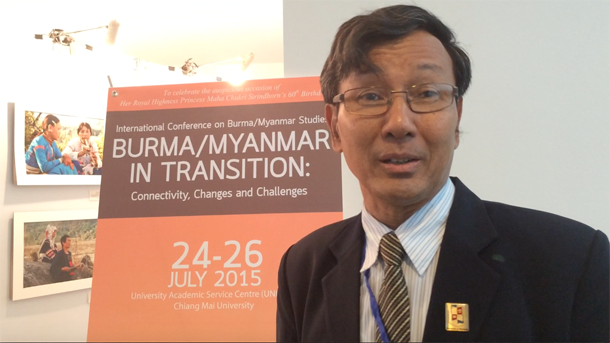CHIANG MAI, Thailand — A three-day conference on Burma studies opened in the northern Thai city of Chiang Mai on Friday, featuring a range of speakers and participants that includes scholars, researchers, journalists and NGO workers.
The conference, titled “Burma/Myanmar in Transition: Connectivity, Changes and Challenges,” is being attended by more than 250 participants from Burma, Thailand and others countries, with a focus on academic approaches to issues facing the country and its ongoing political transition.
Co-organized by Mandalay University and Chiang Mai University, 53 panels and roundtable discussions are to be held over three days. The events will touch on a wide range of issues, from socioeconomic and cultural matters to Burma’s peace process, its ethnic diversity and the role of the press in a fluid media environment.
Mandalay University and Chiang Mai University signed a memorandum of understanding on cooperation and the two institutions of higher learning co-organized the conference.
Professor Maung Thynn, the rector of Mandalay University, said his institution was well suited to spearhead the conference “because Mandalay University is rich in cultural and social studies.”
He told The Irrawaddy that views from international “developed partners” were welcomed and necessary to ensure Burma’s smooth transition from dictatorship to democracy, a process begun in 2011 that has brought greater openness to the forces of globalization and dramatic changes in some cases.
“In the past, we only had the inner circle’s views,” said Professor Maung Thynn, the rector of Mandalay University. “Now we are accepting the diverse views of these scholars, as the country is in its transition.”
Dozens of lecturers and scholars from Burma, many of them from Mandalay University, are joining the conference as well as NGOs and Burmese civil society groups from across the nation and based in areas along the Thai-Burma border. Chiang Mai itself has long been home to a sizeable population of Burmese dissidents and nongovernmental organizations.
Maung Thynn said despite many challenges facing Burma, the development of human resources was a top priority.
“Scholars have been struggling to be ourselves as scholars were not used to these kind of independent studies under the highly centralized society [of the past],” he said, referring to the former junta’s tight control over a university system that fell into shambles over the course of 50 years of military rule.
“They will get these concepts first, and then this will be followed by adaptation. By that I mean I want them to gain knowledge of these concepts, not only from the university campus, but also to develop their skills and capacities,” Maung Thynn said.
Dr. Chayan Vaddhanaphuti, director of Chiang Mai University’s Center for Asian Studies, told The Irrawaddy that he hoped the relationship between the two organizing universities could be a symbiotic one.
“From a Thai scholar’s perspective, we do not know much about Burma or Myanmar culture or society particularly; the past, the present and also in this transition period.”
“This [conference] is to open up new knowledge terrain by inviting scholars from Myanmar, and from international institutions, to come and discuss, so we can learn,” Chayan added. “At the end we would like to set up some kind of Burma Studies Center at this university.”
The conference ended its opening day with the launch of three books on Burma issues, the release of a report on harassment faced by activists in the country and a screening of a documentary on Burmese street artists.

















